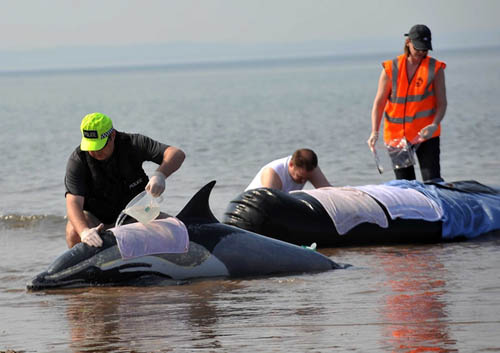THE lives of dozens of whales, dolphins and seals could be saved around the coast of Scotland each year with the creation of Europe’s first net-busting rescue team.
Many marine mammals are injured and killed annually as a result of getting caught in fishing nets, ropes or lobster traps.
But a squad of specially-trained volunteers, known as the Large Whale Disentanglement Team (LWDT), is being created to respond to emergencies.

The team of five – including marine medics and experts with experience of mass beaching – will help “increase survival chances” of distressed animals.
Similar whale rescue services are already available across the globe in places such as South Africa, Australia, Florida and Hawaii.
The LWDT – who will be based in the north-east of Scotland – will be managed by the British Divers Marine Life Rescue (BDMLR).
Once fully trained, the volunteers will save sea mammals caught in aquatic emergencies in open water anywhere around the UK and even abroad.
Whales and other majestic creatures can die from exhaustion or starvation if they become entangled in man-made marine debris.
In September last year 26 pilot whales were stranded on a beach at Pittenweem in Fife.
Sadly 16 of the creatures died but workers from the BDMLR managed to save ten members of the pod by using a system of sheets to keep them wet and hydrated.
Rescue volunteers then managed to return them safely to the Firth of Forth using a series of specialist floats.
“Hazardous”
Colin McFadyen, the BDMLR regional co-ordinator for north-east Scotland, said: “As marine mammal medics we are used to responding to incidents on the shore after animals have stranded.
“Now for the first time we’ll be able to go to distressed animals while they are still at sea – increasing survival chances and cutting down on their stresses.”
The five members of the LWDT include group commander Ali Jack, Heather Greig, Leigh-Anne Adams and Kelly Beatson from Aberdeen and Cath Bain from Stonehaven in Aberdeenshire.
This weekend they will participate in their final training session off the coast of Mey and Dunnet Head in Caithness where they will practise using specialist cutting gear to free tangled animals.
But they will also be trained in how to react if a distressed animal lashes out by swiping at them using its fins or tail.
Mr Jack added: “Approaching a distressed animal of this size and power is one of the most hazardous tasks we’ll ever have to do and the team wouldn’t be able to do this without specialist training.”
Any members who spot animals in difficulty should call the team’s rescue helpline on 01825 765546.